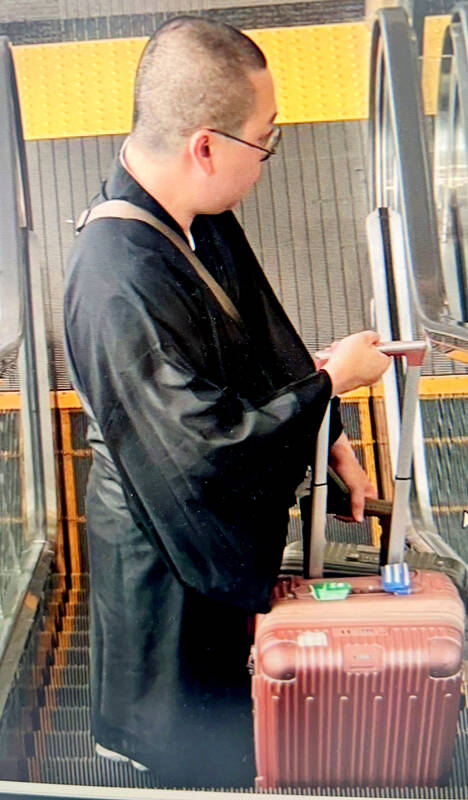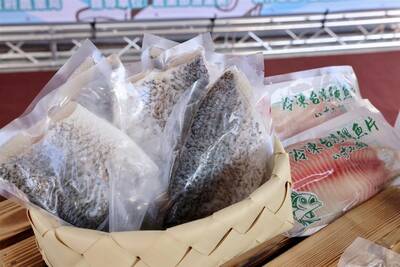Customs officers at Taiwan Taoyuan International Airport on Sunday seized 560 packs of heated tobacco products from three people traveling from Japan, a source familiar with the matter said on Monday.
The products were seized from a Taiwanese man disguised as a Japanese monk and two other passengers on China Airlines Flight CI 105 from Tokyo, the source said.
The man dressed himself as a monk to reduce the likelihood of being inspected, but others on the flight had seen the three packing the items at Narita airport and photographed their activity, the source said, adding that they reported the suspicious activity to customs officers upon their arrival in Taiwan.

Photo courtesy of a reader
Officers searched the three when they arrived and discovered the heated tobacco products in their carry-on baggage, the source said, adding that the products were seized and stored in a nearby warehouse until health authorities collect and destroy them.
Amendments to the Tobacco Hazards Prevention Act (菸害防制法) that took effect on March 22 last year say that people caught illegally bringing e-cigarettes or heated tobacco products into Taiwan face a maximum fine of NT$5 million (US$155,434).
In other news, a shipment of chopping boards imported from South Korea by e-commerce operator Coupang Inc was seized at the border after failing to meet safety standards, the Food and Drug Administration (FDA) said yesterday.
The cypress wood products on April 11 failed a dissolution test using acetic acid and ethanol, FDA Deputy Director-General Lin Chin-fu (林金富) said, adding that the 20kg shipment would either be returned to its country of origin or destroyed.
The kitchenware was the seventh such shipment imported by Coupang in the past six months that failed to meet Taiwan’s safety standards, the FDA said.
Batch-by-batch inspections of chopping boards imported from South Korea by the e-commerce operator would continue, Lin said.
Eight other imported items also failed safety inspections, a list issued by the FDA showed.
Among the other goods were barley leaf powder from China, cayenne chili powder from Malaysia and fresh truffles from Bulgaria, it said.
The powders contained pesticide residue in excess of tolerable levels, it said.
All imported dried chili and pepper powder, regardless of where they are imported from, are subject to a 100 percent inspection rate at Taiwan’s border, Lin said, adding that this includes testing for Sudan dyes and pesticides.

Taiwan's Vice President Hsiao Bi-khim (蕭美琴) said Saturday that she would not be intimidated by the Chinese Communist Party (CCP), following reports that Chinese agents planned to ram her car during a visit to the Czech Republic last year. "I had a great visit to Prague & thank the Czech authorities for their hospitality & ensuring my safety," Hsiao said on social media platform X. "The CCP's unlawful activities will NOT intimidate me from voicing Taiwan's interests in the international community," she wrote. Hsiao visited the Czech Republic on March 18 last year as vice president-elect and met with Czech Senate leadership, including

There have been clear signs of Chinese Communist Party (CCP) attempts to interfere in the nationwide recall vote on July 26 in support of Chinese Nationalist Party (KMT) legislators facing recall, an unnamed government official said, warning about possible further actions. The CCP is actively involved in Taiwanese politics, and interference in the recall vote is to be expected, with multiple Chinese state media and TAO attempts to discredit the Democratic Progressive Party (DPP) and undermine public support of their recall movement, the official said. This interference includes a smear campaign initiated this month by a pro-Beijing Hong Kong news outlet against

A week-long exhibition on modern Tibetan history and the Dalai Lama’s global advocacy opened yesterday in Taipei, featuring quotes and artworks highlighting human rights and China’s ongoing repression of Tibetans, Hong Kongers and Uighurs. The exhibition, the first organized by the Human Rights Network for Tibet and Taiwan (HRNTT), is titled “From the Snowy Ridges to the Ocean of Wisdom.” “It would be impossible for Tibetans inside Tibet to hold an exhibition like this — we can do it. because we live in a free and democratic country,” HRNTT secretary-general Tashi Tsering said. Tashi Tsering, a Taiwan-based Tibetan who has never

A first shipment of five tons of Taiwan tilapia was sent from Tainan to Singapore on Wednesday, following an order valued at NT$600,000 (US$20,500) placed with a company in the city. The products, including frozen whole fish and pre- cooked fish belly, were dispatched from Jiangjun Fishing Harbor, where a new aquatic processing and logistics center is under construction. At the launch, Tainan Mayor Huang Wei-che (黃偉哲) called the move a “breakthrough,” marking Taiwan’s expansion into the Singaporean tilapia market. Taiwan’s tilapia exports have traditionally focused on the United States, Canada, and the Middle East, Huang said, adding that the new foothold in